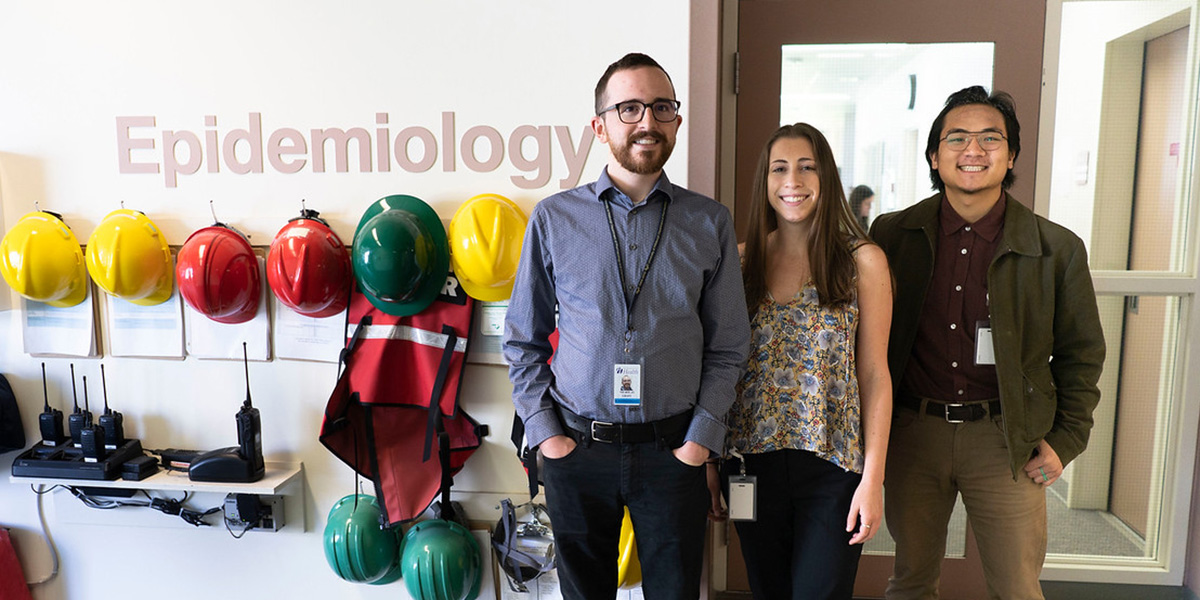
Students provide on-demand support for health departments while gaining hands-on experience
WRITTEN BY ALLEGRA ABRAMO
ILLUSTRATIONS BY KELLY THOMPSON
One morning in October 2018, Professor of Epidemiology Janet Baseman received an urgent request from the Washington State Department of Health: They had detected an outbreak of hepatitis B. Could the Student Epidemic Action Leaders (SEAL) Team send one of its specially trained graduate students to help with the investigation?
By the next day, a SEAL was helping to assemble a mass of data into a coherent picture of the outbreak, enabling the department to target its vaccination campaign.
That kind of real-world experience and impact is why Baseman – who didn’t have such opportunities as a student – created the SEAL Team.
Started in 2015, the program trains graduate students in field epidemiology skills such as outbreak investigation and interviewing, then deploys them to provide critical, short-term assistance to state and local health departments. Undergraduates can assist with projects under the supervision of graduate-level SEALs.
“I would have died for something like this when I was in public health school, a chance to actually work in a real setting,” said Scott Lindquist, the Washington State Department of Health epidemiologist for communicable diseases. “And then it’s good for Department of Health, because they’re usually well trained, highly motivated students and good interviewers.”
TRACKING ZIKA, MEASLES AND FOODBORNE ILLNESSES
In their nearly 4,000 hours of service to date, SEALs have interviewed people sickened by foodborne illnesses, helped improve the state’s disease reporting system and assisted with the local response to the Zika virus. The current cohort of SEALs includes students from every department in the School of Public Health. Beyond communicable disease projects, their work has expanded to support rural health departments, emergency preparedness, maternal and child health programs, and projects in refugee health and interpersonal violence. A half-dozen SEALs also have spent the last three summers in Zimbabwe, collaborating on research with that country’s field epidemiology training program.
In addition to backstopping perennially short-staffed public health departments, the SEAL Team is helping to train and recruit the next generation of public health workers, said Lindquist, who was an early champion of the program.
That’s especially important as the current workforce ages and retires, said Baseman, who is also associate dean for public health practice. “If you want to get students interested in practice work,” she said, “it’s best to get them hooked while they’re still in school, before they go off along another path.”
OPENING VISTAS TO NEW CAREERS
Kate McConnell started her master’s degree assuming she’d go into academic research. Then she sampled working with state and local health departments over the course of the yearlong SEAL program.
When an outbreak of mumps hit the UW campus, McConnell worked with the University’s Environmental Health & Safety Department to manage and analyze data related to the cluster, serving as a primary contact with the local health department.
“I loved all the experiences that I had in the SEAL Team,” McConnell said. “It was really one of the major highlights of my master’s degree.”
It also altered her career trajectory. Now a second-year doctoral student in applied epidemiology, McConnell plans to work for a health department when she graduates.
McConnell will join the growing cadre of SEALs whose skills make them sought-after hires. Out of 51 SEAL Team alumni, at least a dozen have gone to work for public health practice agencies in temporary or permanent jobs.
Even before she graduated this spring, former SEAL Samantha Rice started in a temporary epidemiologist position with the state, where she supports surveillance for measles, mumps and other vaccine-preventable diseases.
“Having a job as an epidemiologist when I graduated is pretty amazing, and I don’t think that would have been the case without participating in the SEAL Team,” said Rice. “The networking opportunities from the SEAL team are invaluable.”

BUILDING BRIDGES BETWEEN ACADEMIC AND PRACTICE COMMUNITIES
No matter where SEALs ultimately work, said Baseman, they are better positioned to build bridges between universities and the practice community.
Baseman envisions a more collaborative future in which communities’ public health problems inform academic research, which in turn is used to improve practice. “So each system is feeding the other in ways that make public health better for everybody,” she said.
“This generation of students will be the ones who can build these bridges,” she said.
“That’s why this is important.”
Whether interviewing diners in Seattle about an E.coli outbreak or nurses in Zimbabwe about malaria control, many of the same essential field epidemiology skills apply.
But in Zimbabwe the conversation is likely to start with a cup of tea and a friendly chat.
“You learn a lot from seeing different cultural approaches to health and health care,” said Samantha Rice, who spent the summer of 2018 researching barriers to malaria outbreak detection and control in rural Zimbabwe while completing her Master of Public Health in Epidemiology.
Before deploying to Africa, Rice received training in field epidemiology with the Student Epidemic Action Leaders (SEAL) Team and practiced those skills in assignments with state and local health departments.
Janet Baseman, who created the SEAL Team in 2015, was inspired to expand to Zimbabwe after School of Nursing faculty invited her to visit their study-abroad program there to meet with faculty at the University of Zimbabwe and leadership of the Zimbabwean Ministry of Health.
Over the last three summers, a half-dozen SEALs have collaborated on projects with the Zimbabwe Ministry of Health and Field Epidemiology Training Program. The exchange has also brought Zimbabwean epidemiology trainees to Seattle.
Results of the SEALs’ malaria study appeared in the journal Global Public Health in July 2019. Co-authors include UW School of Public Health students and faculty, School of Nursing faculty, and their collaborators in Zimbabwe.